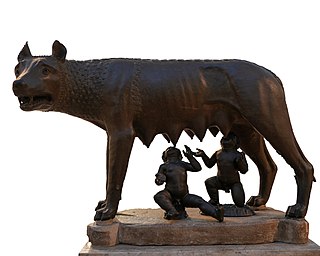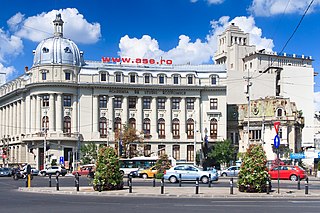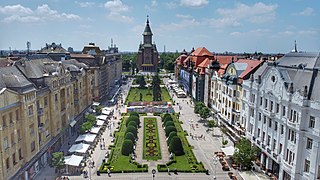The Capitoline Wolf is a bronze sculpture in Rome depicting the city's founding.
Capitoline Wolf may also refer to the following similar statues:

The Capitolium or Capitoline Hill, between the Forum and the Campus Martius, is one of the Seven Hills of Rome.

The Capitoline Museums are a group of art and archaeological museums in Piazza del Campidoglio, on top of the Capitoline Hill in Rome, Italy. The historic seats of the museums are Palazzo dei Conservatori and Palazzo Nuovo, facing on the central trapezoidal piazza in a plan conceived by Michelangelo in 1536 and executed over a period of more than 400 years.

The Capitoline Wolf is a bronze sculpture depicting a scene from the legend of the founding of Rome. The sculpture shows a she-wolf suckling the mythical twin founders of Rome, Romulus and Remus. According to the legend, when King Numitor, grandfather of the twins, was overthrown by his brother Amulius in Alba Longa, the usurper ordered them to be cast into the Tiber River. They were rescued by a she-wolf that cared for them until a herdsman, Faustulus, found and raised them.

Piața Romană is a major traffic intersection in Sector 1, central Bucharest.

The Capitoline Wolf Statue in Cluj-Napoca, Romania is located on Eroilor Boulevard, in the city centre on the banks of the Someșul Mic River.

Iulian Pop was an Austro-Hungarian and Romanian lawyer and politician, who became the first Romanian mayor of Cluj on 19 January 1919, a month after Transylvania became part of the Romanian state. He remained mayor until 13 April 1923, when he resigned for health reasons and was succeeded on an interim basis by Aurel Moga.

Dealul Mitropoliei, also called Dealul Patriarhiei, is a small hill in Bucharest, Romania and an important historic, cultural, architectural, religious and touristic point in the national capital. From a religious point of view, it is one of the centres of Romanian Orthodoxy: the headquarters of the Romanian Patriarchy and the residence of the Patriarch are both located here.
Antinous was the favorite and lover of Roman Emperor Hadrian.

The Capitoline Wolf is a monument in Central Chișinău, Moldova. It is located in front of the National History Museum of Moldova.

The Sfatul Țării Palace is a building in Chișinău, Moldova.
La lupa is Italian for "the she-wolf", a female wolf.

The Statue of Trajan and the She-wolf is a statue by Vasile Gorduz located on the steps of the National Museum of Romanian History on Calea Victoriei in central Bucharest. It depicts a nude Trajan holding in his arms the Capitoline Wolf, which is doubled as the Dacian Draco, the war standard of the Dacians.

The Capitoline Wolf Statue is a sculpture of a she-wolf nursing Romulus and Remus in Cincinnati, Ohio, United States. The bronze sculpture on a granite and marble base is located in Eden Park at the Twin Lakes area overlooking the Ohio River. It is a replica of the original Capitoline Wolf in the Musei Capitolini of Rome, Italy.

The Victory Square, known until 1990 as the Opera Square, is the central square of Timișoara. It is the place where Timișoara was proclaimed on 20 December 1989 the first city free of communism in Romania. It was a main boulevard, transformed into a square after the closure of the southern side by the construction of the Metropolitan Cathedral. The opposite poles of the square consist of the Opera to the north and the Metropolitan Cathedral to the south. From the Opera to the Cathedral the promenade on the right is called Corso, and the one on the left is called Surogat. Both have protected architectural ensembles of local historical importance.

The Capitoline Museums in Rome hold parts of a bronze colossus of Constantine. The colossal statue of a Roman emperor was probably made in the 4th century but only fragments survive. It is usually interpreted as depicting Constantine the Great.

Capitoline Wolf is a statue located in Timișoara's Victory Square, between the Metropolitan Cathedral and the Palace of Culture. Copy of the famous Capitoline Wolf, the statue was donated by the municipality of Rome in 1926 as a symbol of Latinity that unites the Romanian and Italian peoples. The statue depicts the legend of the founders of Rome, the brothers Romulus and Remus, suckled by a she-wolf. The statue is inscribed in the list of historical monuments with the code TM-III-m-B-06314.

The Capitoline Wolf Statue is a statue located in I.C. Brătianu Boulevard in Bucharest, Romania. It is a historical monument, with the National Register of Historic Monuments in Romania code B-III-m-B-20029.